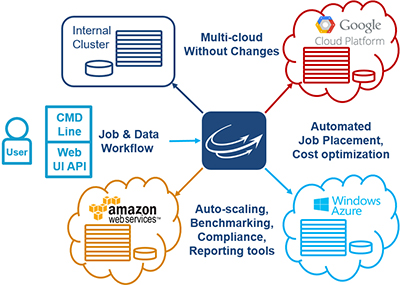News
Microsoft Buys Cloud Orchestration Vendor Cycle Computing
The company's platform includes a workflow engine and load balancer which utilizes cloud resources to enable computation at Web scale.
Microsoft's Azure platform got a boost in the high-performance computing (HPC) realm by buying a vendor that specializes in extremely large and complex workloads. At the same time, Microsoft hopes it serves as an on-ramp to increased public cloud adoption.
Cycle Computing is a leading provider of orchestration software designed to deploy and manage large workloads in the three major public clouds, as well as in on-premises and hybrid datacenter infrastructures.
Cycle Computing was ahead of its time 12 years ago with its orchestration software designed to deploy and manage virtual clusters and storage to enable HPC workloads such as machine learning, genomic research and running complex simulations. The company's orchestration software now can run those workloads using any combination of the three largest public clouds: Amazon Web Services, Microsoft Azure and Google Cloud. Cycle Computing says its software is used by companies of all sizes including some of those with some of the largest workloads including JP Morgan Chase, Lockheed Martin, Pfizer and Purdue University.
The orchestration platform, called CloudCycle, includes a workflow engine and load balancer which utilizes cloud resources to enable computation at any scale, while using encryption to ensure data remains secure. Cycle Computing is on pace to manage 1 billion core hours this year and is growing at a 2.7x annual pace, according to the company's CEO Jason Stowe, in an announcement about the Microsoft acquisition.
 [Click on image for larger view.] Figure 1. Cycle Computing's CloudCycle HPC workflow and load balancing platform.
[Click on image for larger view.] Figure 1. Cycle Computing's CloudCycle HPC workflow and load balancing platform.
Cycle Computing's customers spend $50 million - $100 million on cloud services, according to Stowe, though he emphasized its software also supports on-premises and hybrid workloads. "Our products have helped customers fight cancer and other diseases, design faster rockets, build better hard drives, create better solar panels and manage risk for peoples' retirements," Stowe noted.
Microsoft Corporate VP Jason Zander, who announced the acquisition, said Cycle Computing brings its tools, capabilities and experience supporting some of the largest supercomputing scenarios to Azure. Zander also believes Cycle Computing will play a role in picking up the pace in mainstream cloud migration.
"Cycle Computing will help customers accelerate their movement to the cloud and make it easy to take advantage of the most performant and compliant infrastructure available in the public cloud today," according to Zander.
Asked about whether CloudCycle will continue to support AWS and Google Cloud, a spokeswoman for the company said it will continue to support existing clients whose implementations include the two competitors, but "future Microsoft versions released will be Azure focused. We are committed to providing customers a seamless migration experience to Azure if and when they choose to migrate."
Interestingly, Amazon Web Services showcased Cycle Computing at its first AWS Summit event in New York four years ago. As noted in Stowe's blog post announcing the acquisition, he noted that the company was self-funded with just $8,000 put on a credit card and only took in some funding from angel investors.
In an interview during the 2013 AWS Summit, Stowe described an HPC job that used 10,600 server instances in Amazon's EC2 to perform a job for a major pharmaceutical firm. To run that simulation in-house would require the equivalent of a 14,400 square-foot datacenter which, based on calculations from market researcher IDC, would cost $44 million, he said at the time. "Essentially, we created an HPC cluster in two hours and ran 40 years of computing in approximately 11 hours," Stowe explained. "The total cost for the usage from Amazon was just $4,472."
About the Author
Jeffrey Schwartz is editor of Redmond magazine and also covers cloud computing for Virtualization Review's Cloud Report. In addition, he writes the Channeling the Cloud column for Redmond Channel Partner. Follow him on Twitter @JeffreySchwartz.